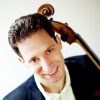
The F-Word
Aron Zelkowicz
“Do you play with a regular ensemble?” the lady at Kinko’s asked me.
Lately I’ve noticed this to be one of the routine first questions that new acquaintances throw my way, especially in New York. My theory is that music aficionados latch on to this question, while novices (often in airports, as we can all testify) tend to focus on the size of the cello case and the hilarity of imagining something else inside it: an AK-47, King Kong’s tennis racket, mother. In this instance my cello was not with me, but the scraps of dissected scores scattered across the work station easily gave away my vocation.
She asked, “Do you play with a regular ensemble?”, which is exactly the wording that gets me like a deer in headlights. The question is completely understandable and practical; if I had a pat answer I could have quickly satisfied her curiosity in terms of geography (Lincoln Center, Westchester, Brooklyn), genre (orchestra, Broadway, string quartet), and style (Baroque, avante-garde, Finnish metal cover songs). Ok, I get carried away—unfortunately, no one could mistake me for a Finnish rocker.
That modifier “regular” doesn’t let one wiggle out of the question by rattling off upcoming gigs. The question is at once “what kind of music do you play?” and “who do you belong to?” It is understandable that people want to compartmentalize you for their convenience, but the notion of belonging to a larger entity is desirable to me as well. Cellists are social creatures, as the other distinguished bloggers on this site demonstrate with their varied experiences as international soloists, string quartet players, members of major orchestras, teachers, luthiers, and media executives. The cellist provides the foundation for an ensemble, and in turn we rely on the ensemble or institution to help keep us in orbit. As the current state of affairs proves ever more fragile (I write this in the wake of the recent headlines coming from Philadelphia, Detroit, Syracuse, Honolulu, and New Mexico), my identity remains ever married to a reliance on continual self-improvement, inspiring colleagues, interesting repertoire, appreciative audiences, and financial stability.
The pat answer to the Kinko’s lady is what I regarded in my college days as the dreaded F-word: I’m a Freelancer. It is the short version of explaining “last year I played in an off-Broadway opera, I play solo recitals in small venues around town, I sub in a major orchestra out of town, I’m giving a master class in Alaska next week…”
My main activity comprises exactly what I was doing at Kinko’s—wearing one of the many hats as the director of my own music festival. This project has evolved from a one-time experiment eight years ago to a potential calling. Since then I’ve had the hands-on education of working as producer, contractor, performer, fundraiser, graphic designer, program annotator, radio and newspaper interviewee, chauffer, caterer, and (obviously) music librarian. I still consider this role to be part of my identity as a freelance musician, and yet the label doesn’t begin to imply that one moment I’m cutting and pasting music at Kinko’s, the next I’m practicing Strauss excerpts for an audition, then next I’m on the cell phone discussing the logistics of moving a 400-lb. reed organ down sixteen steps.
The idea of the Freelance Musician hovered over lunch with Mr. Katz at the bustling dim sum restaurant in Boston’s Chinatown. And not just because that topic was on hand. Carts of steamed dumplings, fried tofu, and noodles rolled past us in an infinite, mouth-watering parade. In a minute you have the window of opportunity—pick your dish or let it pass you by. If only professional options were as infinite—in New York, the sea of cello cases bobbing through the subways and cafes is a constant reminder of that. At Kinko’s this reminder was only as far as the nearest recycling bin for a xeroxed score recently discarded by another cellist. With this competitive environment in mind, do you take the community school teaching job when it comes along, or hold out in case your string quartet wins the next big competition? If you are offered the chance to tour with an orchestra for three weeks, what if it conflicts with an audition for a year-long church gig? At China Pearl, everything looked tempting, yet I knew I had to pace myself, and we hadn’t yet seen the roast duck.
But get the roast duck we did, and beyond that scrumptious lunch I am thrilled that Mr. Katz has invited me to contribute to cellobello from this D.I.Y. perspective. If one thinks about Kinko’s function, the store was founded to provide the makeshift office for the itinerant Do-It-Yourselfer. It has become the New Way of Being for the creative, motivated, resourceful, and under-employed. I look forward to sharing my experiences with and hearing back from all fellow cello D.I.Y.ers!
Subjects: Artistic Vision
